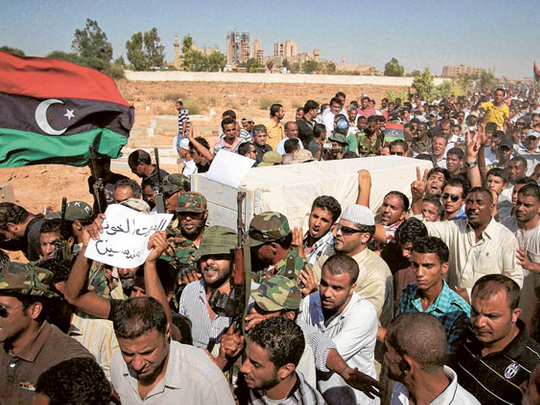
Benghazi: The Libyan rebels' military commander was killed by his comrades while in custody after he was arrested by the opposition's leadership on suspicion of treason, witnesses said, in a sign of disarray that posed a major setback for the movement battling Muammar Gaddafi.
The slaying of Abdul Fattah Younis raised fear and uncertainty in Benghazi, the de facto rebel capital. Thousands marched behind his coffin, wrapped in the rebels' tricolour flag, to the graveyard for his burial, chanting that he was a martyr "beloved by God". Troops fired a military salute as the coffin arrived, and angry and grieving supporters fired wildly into the air with automatic weapons.
At the graveside Friday, Younis' son, Ashraf, broke down, crying and screaming as they lowered the body into the ground and — in a startling and risky display in a city that was the first to shed Gaddafi's rule nearly six months ago — pleaded hysterically for the return of the Libyan leader to bring stability.
"We want Muammar to come back! We want the green flag back!" he shouted at the crowd, referring to Gaddafi's national banner.
Younis' slaying appeared to shake both the rebels' leadership body, the National Transitional Council, and its Western allies, who have heavily backed the rebels controlling most of eastern Libya.
Recognition
Two weeks ago, 32 nations including the US made a major commitment by formally recognising the opposition as the country's legitimate government — a significant boost after many allies hesitated in part because the rebels, a mix of tribes and factions, were largely an unknown quantity.
Those Western worries will likely be deepened if Younis' slaying opens major splits among the fractious rebels. Divisions would also weaken the opposition's campaign to oust Gaddafi, which has largely stalled in a deadlock despite the four-month-old Nato bombing campaign against regime forces.
In Washington, State Department spokesman Mark Toner said the circumstances of Younis' death remained unclear, but he pressed the opposition to shore up any cracks in their front against Gaddafi.
"What's important is that they work both diligently and transparently to ensure the unity of the Libyan opposition," Toner said.
Younis' body was found Thursday, dumped outside Benghazi, along with the bodies of two colonels who were his top aides. They had been shot and their bodies burned.
Younis was Gaddafi's interior minister until he defected to the rebellion early in the uprising, which began in February, bringing his forces into the opposition ranks. His move raised hopes among rebels and Western allies that the uprising could succeed in forcing out the country's ruler of more than four decades. But some rebels remained deeply suspicious that he retained loyalties to Gaddafi.
The National Transitional Council says it is investigating the killing. It blamed unidentified "gunmen" and has made no confirmation that Younis had been arrested.
It has said only that Younis was gunned down on route to Benghazi, where he had been summoned to discuss "a military matter".
"Everything is under control," the council's finance minister, Ali Tarhouni, told reporters Friday night. "This is just a rough stage we are going through and me and my brothers in the NTC are sure we will get over it."
But a rebel special forces officer under Younis' command said that Younis was taken before dawn Wednesday from his operations room at Zoueitina, just east of the main front with Gaddafi's forces.
Fighters from a rebel faction known as the February 17 Martyr's Brigade came to the operations room and demanded Younis come with them for interrogation, said the officer, Mohammad Agoury, who said he was present at the time.
Agoury said he tried to accompany his commander, "but Younis trusted them and went alone".
"Instead, they betrayed us and killed him," he said.
Internal security force
The February 17 Martyrs Brigade is a group made up of hundreds of civilians who took up arms to join the rebellion. Their fighters participate in the front-line battles with Gaddafi's forces but also act as a semi-official internal security force for the opposition. Some of its leadership comes from the Libyan Islamic Fighting Group (LIFG), an Islamic militant group that waged a campaign of violence against Gaddafi's regime in the 1990s.
An officer with the rebels' internal security forces — the official security force of the National Council — said that the council ordered Younis' arrest after a letter arose earlier this week connecting the commander to Gaddafi. But he suggested the killing had not been authorised by the council and was instead an act of vengeance by rebels.
He said Younis was brought back to the Benghazi area Wednesday and held at a military compound until Thursday, when he was summoned to the Defence Ministry for questioning.
As they left the compound, two men from the security team escorting the detainees opened fire on Younis from their car with automatic weapons, said the officer, who was at the compound and saw the shooting. He said the two men were members of the February 17 Martyrs Brigade and shouted that Younis was a traitor who killed their father in Derna, an eastern town that was once a stronghold of the LIFG.
Officials from the National Transitional Council could not immediately be reached for comment.












